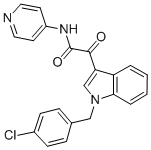Description
Indibulin (D-24851; ZIO-301), a novel synthetic small molecule microtubule inhibitor, destabilizes microtubules and has antitumor activity but does not exhibit neurotoxicity in preclinical animal studies. Indibulin reduces inter-kinetochoric tension, produces aberrant spindles, activates mitotic checkpoint proteins Mad2 and BubR1, and induces mitotic arrest and apoptosis. The drug can discriminate between highly posttranslationally modified tubulin present in mature neuronal microtubules, and less-modified tubulin present in immature neuronal or nonneuronal microtubules.
Uses
Indibulin is a chemotherapeutic drug that destabilizes microtubules and is used to treat aggressive and heterogenous cancers, including breast cancer.
Biological Activity
Indibulin is a microtubule destabilizer that blocks tubulin polymerization (IC50 = 0.3 μM). Blocks cell cycle progression at metaphase and displays antitumor activity against a variety of malignancies in vitro (IC50 values ranging from 0.036 - 0.285 μM). Induces complete tumor remission in the Yoshida AH13 rat sarcoma model in vivo. Lacks neurotoxicity due to an ability to discriminate between posttranslationally modified tubulin in mature neuronal microtubules and less-modified tubulin present in immature neuronal or nonneuronal microtubules. Displays oral availability and efficacy towards MDR tumor cells.
storage
Desiccate at -20°C
Mode of action
Indibulin binds to a site on tubulin that is different from taxane- or Vinca alkaloid-binding sites, destabilizing tubulin polymerization and inducing tumor cell cycle arrest and apoptosis. This agent has been shown to be active against multidrug-resistant (MDR) and taxane- resistant tumor cell lines.



